备考2011高效学习方案英语高二册:unit17 disabilities
文档属性
| 名称 | 备考2011高效学习方案英语高二册:unit17 disabilities |
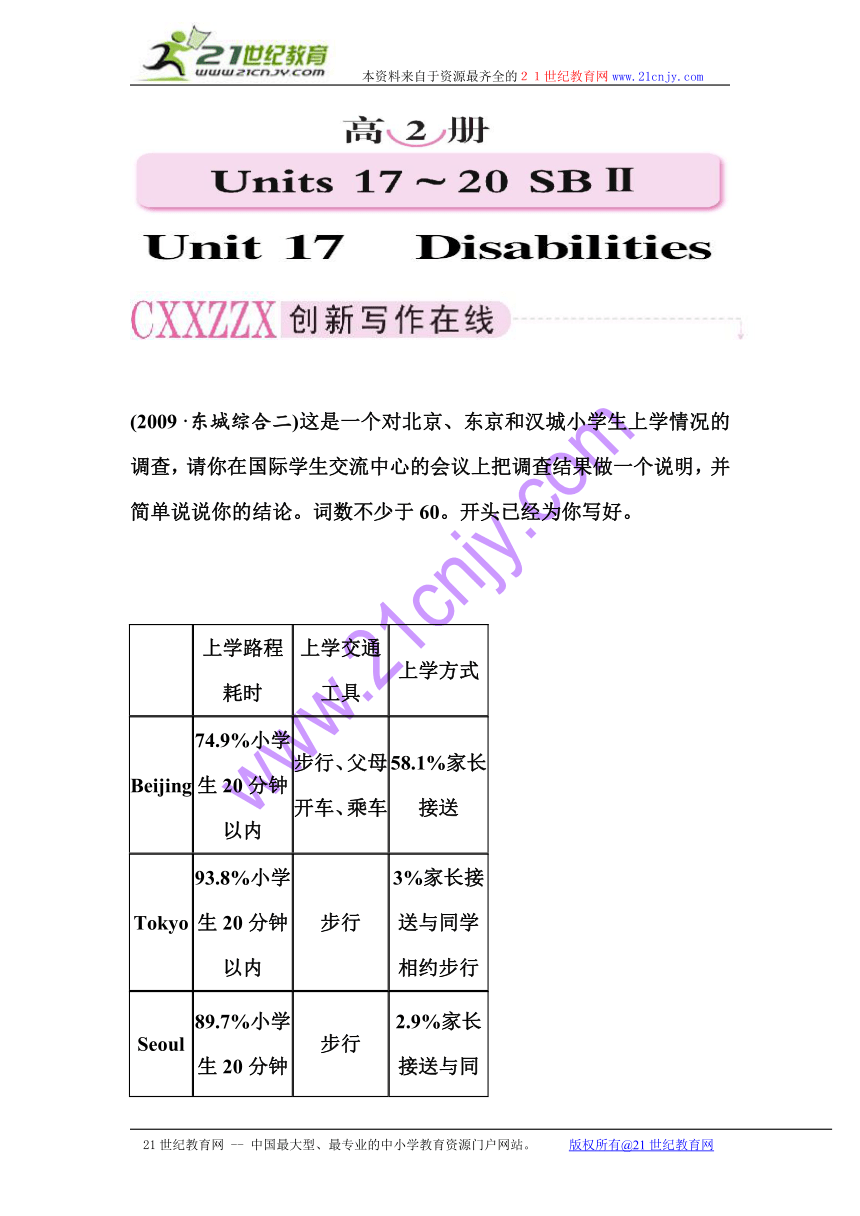
|
|
| 格式 | rar | ||
| 文件大小 | 160.7KB | ||
| 资源类型 | 教案 | ||
| 版本资源 | 人教版 | ||
| 科目 | 英语 | ||
| 更新时间 | 2010-12-14 00:00:00 | ||
图片预览

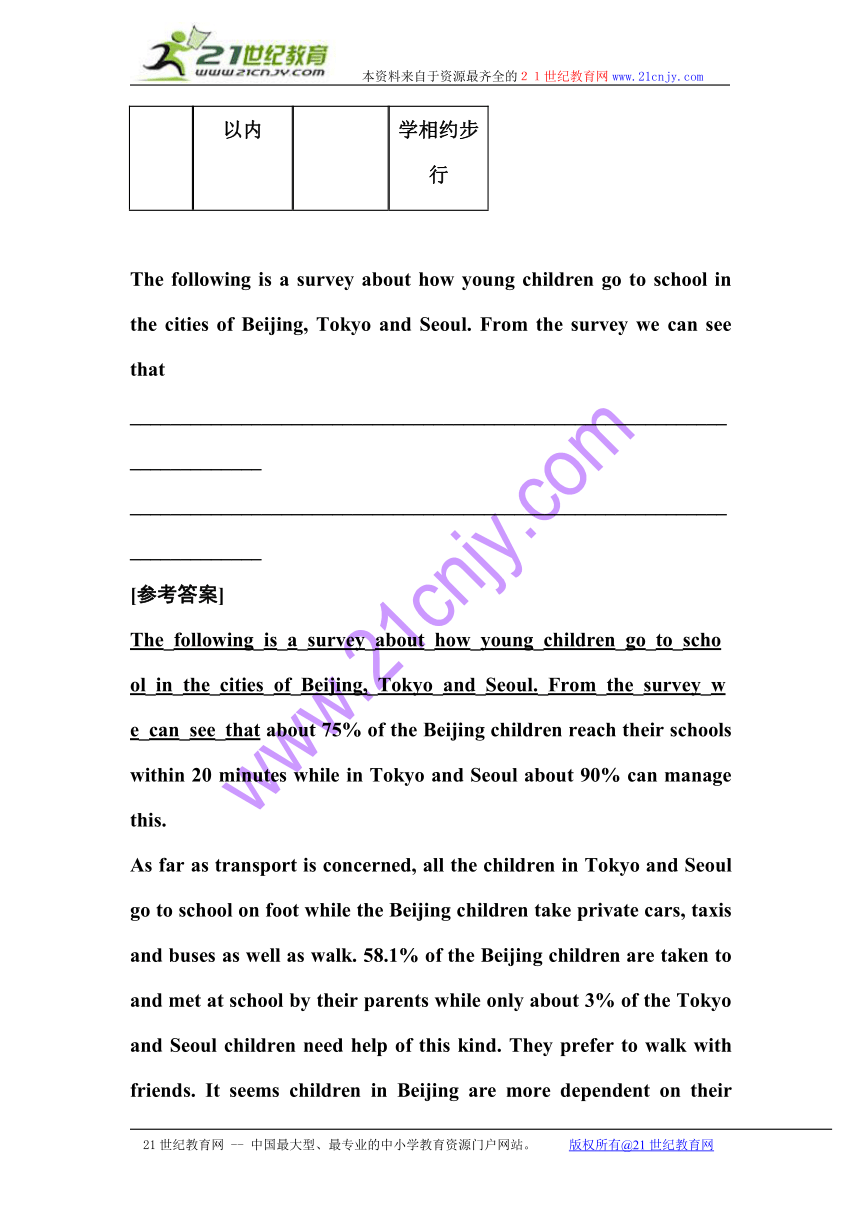
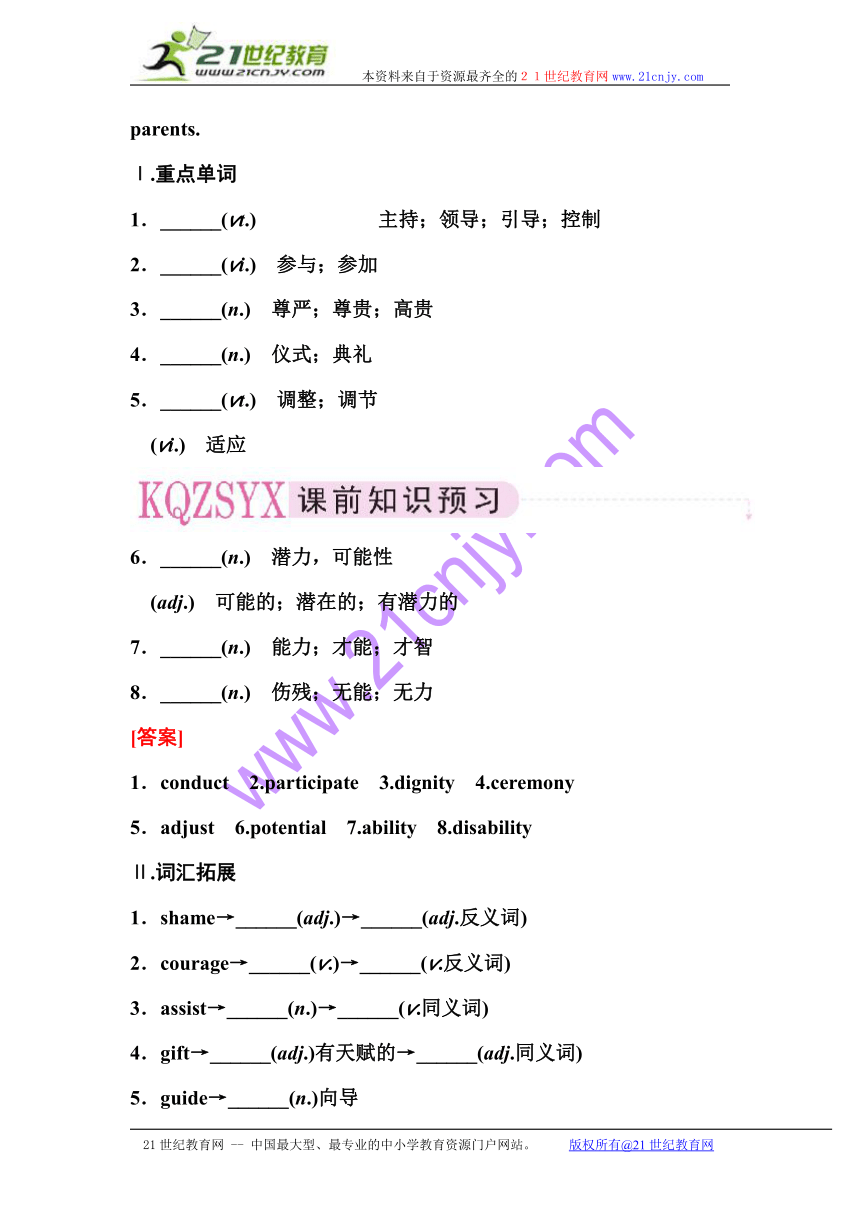
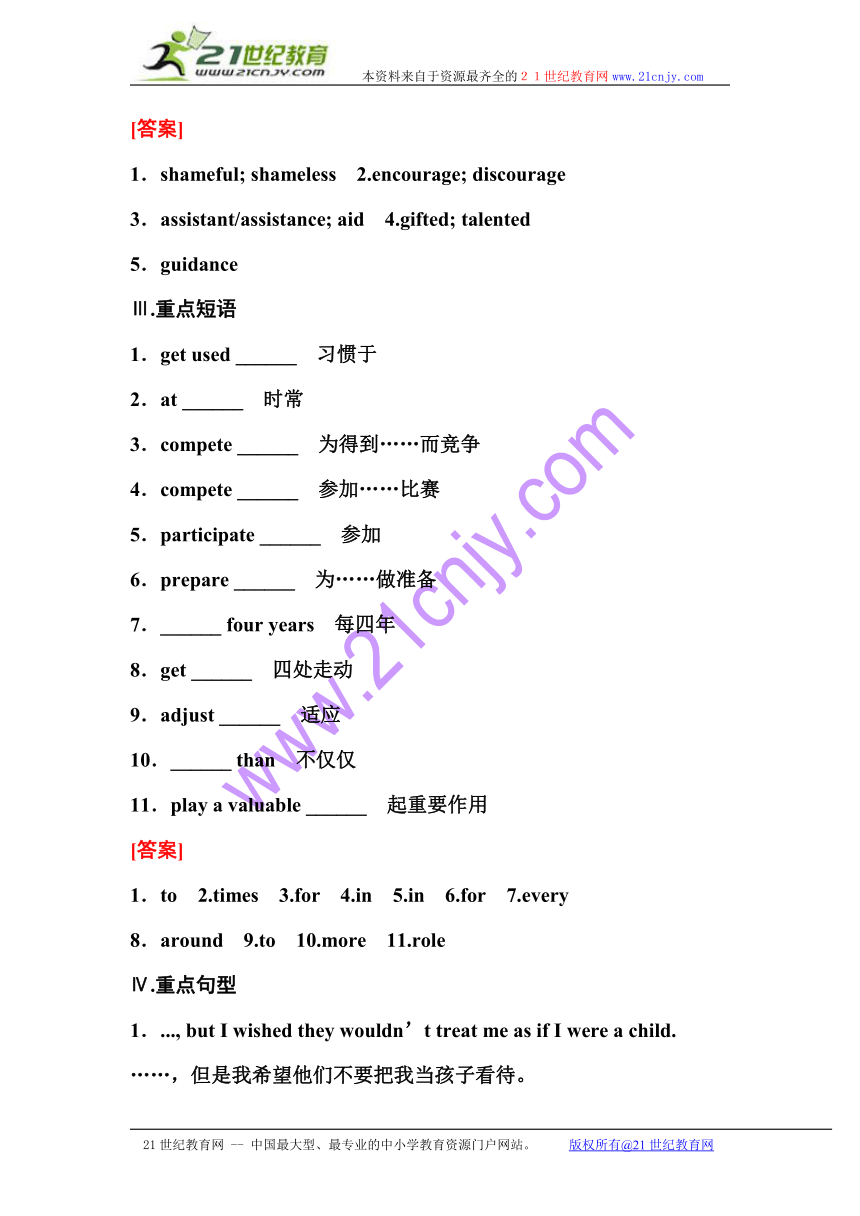
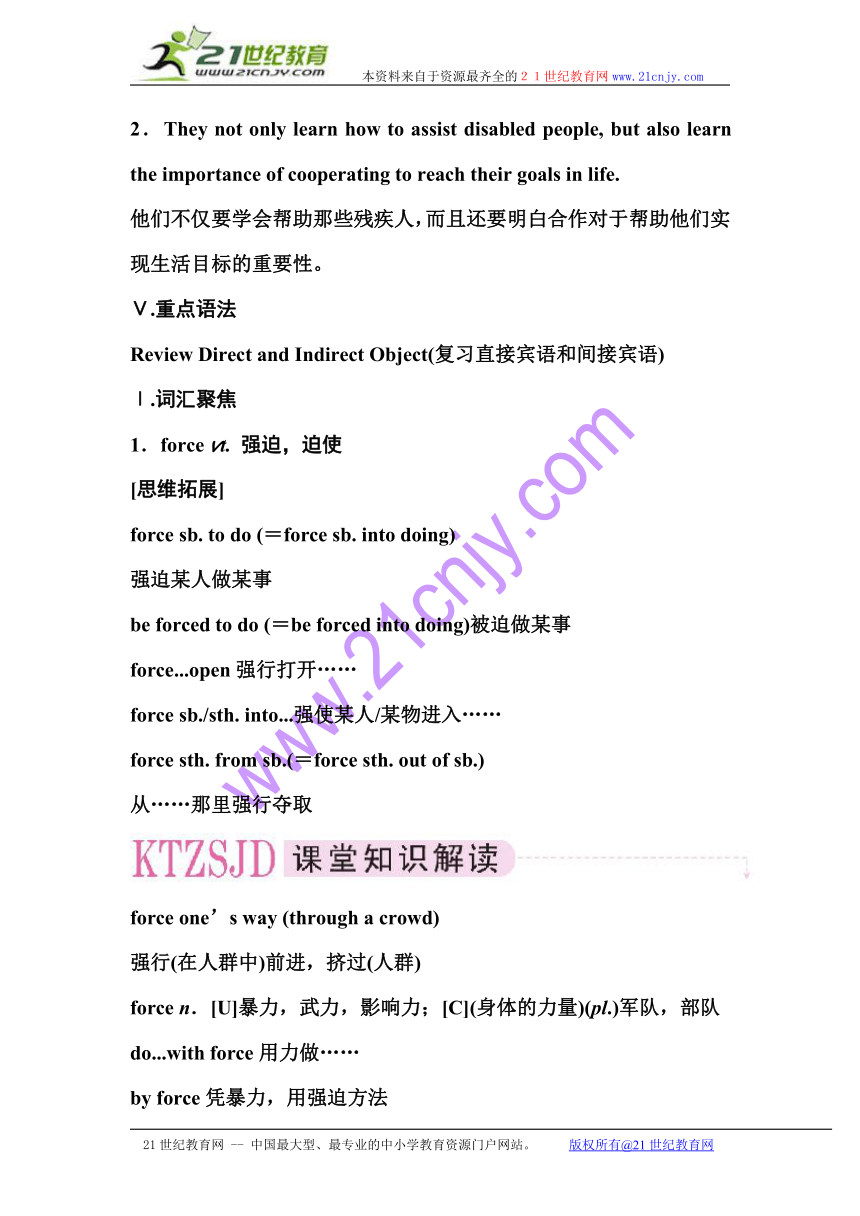
文档简介
本资料来自于资源最齐全的21世纪教育网www.21cnjy.com
(2009·东城综合二)这是一个对北京、东京和汉城小学生上学情况的调查,请你在国际学生交流中心的会议上把调查结果做一个说明,并简单说说你的结论。词数不少于60。开头已经为你写好。
上学路程耗时 上学交通工具 上学方式
Beijing 74.9%小学生20分钟以内 步行、父母开车、乘车 58.1%家长接送
Tokyo 93.8%小学生20分钟以内 步行 3%家长接送与同学相约步行
Seoul 89.7%小学生20分钟以内 步行 2.9%家长接送与同学相约步行
The following is a survey about how young children go to school in the cities of Beijing, Tokyo and Seoul. From the survey we can see that ________________________________________________________________________
________________________________________________________________________
[参考答案]
The_following_is_a_survey_about_how_young_children_go_to_school_in_the_cities_of_Beijing,_Tokyo_and_Seoul._From_the_survey_we_can_see_that about 75% of the Beijing children reach their schools within 20 minutes while in Tokyo and Seoul about 90% can manage this.
As far as transport is concerned, all the children in Tokyo and Seoul go to school on foot while the Beijing children take private cars, taxis and buses as well as walk. 58.1% of the Beijing children are taken to and met at school by their parents while only about 3% of the Tokyo and Seoul children need help of this kind. They prefer to walk with friends. It seems children in Beijing are more dependent on their parents.
Ⅰ.重点单词
1.______(vt.) 主持;领导;引导;控制
2.______(vi.) 参与;参加
3.______(n.) 尊严;尊贵;高贵
4.______(n.) 仪式;典礼
5.______(vt.) 调整;调节
(vi.) 适应
6.______(n.) 潜力,可能性
(adj.) 可能的;潜在的;有潜力的
7.______(n.) 能力;才能;才智
8.______(n.) 伤残;无能;无力
[答案]
1.conduct 2.participate 3.dignity 4.ceremony
5.adjust 6.potential 7.ability 8.disability
Ⅱ.词汇拓展
1.shame→______(adj.)→______(adj.反义词)
2.courage→______(v.)→______(v.反义词)
3.assist→______(n.)→______(v.同义词)
4.gift→______(adj.)有天赋的→______(adj.同义词)
5.guide→______(n.)向导
[答案]
1.shameful; shameless 2.encourage; discourage
3.assistant/assistance; aid 4.gifted; talented
5.guidance
Ⅲ.重点短语
1.get used ______ 习惯于
2.at ______ 时常
3.compete ______ 为得到……而竞争
4.compete ______ 参加……比赛
5.participate ______ 参加
6.prepare ______ 为……做准备
7.______ four years 每四年
8.get ______ 四处走动
9.adjust ______ 适应
10.______ than 不仅仅
11.play a valuable ______ 起重要作用
[答案]
1.to 2.times 3.for 4.in 5.in 6.for 7.every
8.around 9.to 10.more 11.role
Ⅳ.重点句型
1...., but I wished they wouldn’t treat me as if I were a child.
……,但是我希望他们不要把我当孩子看待。
2.They not only learn how to assist disabled people, but also learn the importance of cooperating to reach their goals in life.
他们不仅要学会帮助那些残疾人,而且还要明白合作对于帮助他们实现生活目标的重要性。
Ⅴ.重点语法
Review Direct and Indirect Object(复习直接宾语和间接宾语)
Ⅰ.词汇聚焦
1.force vt. 强迫,迫使
[思维拓展]
force sb. to do (=force sb. into doing)
强迫某人做某事
be forced to do (=be forced into doing)被迫做某事
force...open强行打开……
force sb./sth. into...强使某人/某物进入……
force sth. from sb.(=force sth. out of sb.)
从……那里强行夺取
force one’s way (through a crowd)
强行(在人群中)前进,挤过(人群)
force n.[U]暴力,武力,影响力;[C](身体的力量)(pl.)军队,部队
do...with force用力做……
by force凭暴力,用强迫方法
by force of...借……之力,依据……
the air force空军
labour force劳力
come into force (法律等)实施(不及物动词短语)
put...into force 实施(法律等)(及物动词短语)
[指点迷津]
force与make都可表达“使……,令……”之意,但force表示以武力或暴力作为迫使手段,而make的用法比较广泛,它的强迫性不如force强。两词后接含不定式的复合宾语时force的搭配是force sb. to do,被动形式是be forced to do;而make的搭配是make sb. do,被动形式是be made to do。
Paul doesn’t have to be made ______ others. He always offers to do it.
A. help B. to help
C. helped D. helping
解析:make构成的复合宾语中用不定式作补足语。“(迫)使某人做某事”的主动语态表达是make sb. do,当make用于被动语态时,不定式作主语补足语,省略的不定式符号to要归位,即be made to do。
答案:B
2.ability n. 能力,技能,才能,才智
[思维拓展]
a man of great musical ability
有卓越音乐才华的人
a job suited to your abilities
能发挥你才能的工作
an ability to do sth.做某事的能力
to the best of one’s ability尽某人所能
He soon received promotion(提升), for his superiors realized that he was a man of considerable ______.
A. future B. ability
C. possibility D. opportunity
解析:A意为“将来,未来,前景”;B意为“能力,本领,才能,才智”;C意为“可能性”;D意为“机会,时机”。本题题意为:他很快得到了提升,因为他的上司意识到了他是一个相当有能力的人。
答案:B
3.realize/realise v. 了解,领悟,实现
[思维拓展]
realize one’s meaning领会某人的意思
realize the fact/one’s mistake
意识到事实/某人的错误
realize one’s dream/hope/wish
实现某人的梦想/希望/愿望
He has realized his dream.
His dream has been realized.
His dream has come into reality.
His dream has come true.
His dream has become a reality.
他的梦想实现了。
To her delight, her wish ______ at last.
A. realized B. came true
C. came to D. became into reality
解析:句子的主语是her wish,所以用realize表达“愿望实现”要使用被动语态,或用come true; become a reality不能用into; come to的意思是“苏醒”。
答案:B
4.limit n. 境界,限度;限额;v. 限制,限度adj. limited; limitless
[思维拓展]
within the limit of在……的限度之内
reach the limit of one’s patience忍耐到极限
a limit to sth.某事的限度
safety limits安全线
the limit令人无法忍受的人或事物
within limits在一定范围(限制、限度)之内
limit our spending限制我们的开支
time limit限期
①I’ll help as much as I can, but there’s a limit to what I can do.
②I can’t walk 10 miles; I know my limits.
—Is there any ______ to the time that I can stay here
—Yes, you must leave here before he comes back.
A. number B. length
C. limit D. matter
解析:limit to the time“时间限制”。
答案:C
5.gifted adj. 有天赋的,有才华的;天资特优的
[思维拓展]
a very gifted musician很有才华的音乐家
a school for gifted children天才儿童学校
have a gift for sth./ doing sth.
有某方面/干某事的天赋
①The little girl is a gifted pianist.
②She has a gift for drawing.
③Tom has a gift for learning languages.
He has ______ for language, while his sister is a ______ pianist.
A. gift; gifted B. a gift; gifted
C. a present; present D. present; presented
解析:句意为“他很有语言天赋,而他姐姐是个天才钢琴家。”空一“天赋”应用gift,是可数名词,have a gift for sth.“在……方面有天赋”;空二用形容词,“有天赋的”,gifted。而present用作名词时不表示该词义,当作形容词用时意为“目前的,现在的”。
答案:B
6.remain vi. 保持,逗留,剩余,残存
[思维拓展]
①vi. 留下来(=stay);剩余;残余
He went, but I remained.
他走了,但我留了下来。
Take 5 from 10, and 5 remains.
10减去5,剩下5。
②link-v. 保持;依然(是);仍然(是)
The fact remains to be proved.
事实尚待证明。
③It remains to be seen whether...
……尚待分晓
Having a trip abroad is certainly good for the old couple, but it remains ______ whether they will enjoy it.
A. to see B. to be seen
C. seeing D. seen
解析:题意是“去国外旅行当然对这对老夫妇有好处,但是他们是否喜欢尚待分晓。”题干中的remain是连系动词,it是形式主语,whether they will enjoy it是真正的主语。因为主语从句与动词see是被动关系,故选项A、C应被排除;在实际应用中,动词不定式的一般式常含有“将来”意味,故含“完成”意味的选项D应排除。
答案:B
Ⅱ.短语突破
1.get used to习惯于……
[思维拓展]
①be used to (doing) sth.习惯于做某事(to为介词)
②get/become used to (doing) sth.逐渐习惯做某事(to为介词)
③used to do sth.(to be...)指“过去常常干某事或常常处于某种状态和情况”(既可以谈动作,又可以谈状态或情况,且暗含现在并非如此的意思;它仅用于一般过去时态)
④would do sth.指“过去常常干某事,但并不否定现在还那么干”(仅可以谈动作,不可以谈状态或情况)
⑤be used to do sth.被用来做……
⑥be used for sth.被用于某物
Quite a few people ______ that disaster was sure to strike if a mirror was broken.
A. were used to believe
B. were used to believing
C. used to believe
D. used to believing
解析:句意为“过去许多人常常认为打破镜子预示着厄运准会光临”。used to do指“过去常常干某事”,故此题答案为C。
答案:C
[指点迷津]
get/become used to表示动作,be used to表示状态。其中to为介词,后跟名词、代词、动名词或what从句作宾语。
My granny ______ live in the country by herself, but now she got used to ______ together with us in the city.
A. used to; live
B. got used to; living
C. used to; living
D. was used to; live
解析:该句句意是:我奶奶过去一个人住在农村,但她现在已习惯于与我们一起住在城市里。故第一个空应为used to(过去常常),第二空前的get used to表示“习惯于”,其中的to为介词后跟名词、代词、动名词作宾语,故用动名词living,综合两处空白,C项符合题意。
答案:C
3.get around/about行走,到处走动;(消息)传开;避开,绕开
He was ill last week, but he is getting about now.
上星期他病了,但他现在已下床行走了。
It’s getting about that the peace talks have broken down.
据说和谈已经失败。
A rumour got about that the conference had been cancelled.谣传这个会议被取消了。
[指点迷津]
get around=get about/round
It was not a serious illness, and she soon ______ it.
A. got over B. got on with
C. got around D. got out of
解析:本题考查动词短语辨析。get over有“从(病、损失等)中恢复过来”的意思;get on with是“进展,相处”的意思;get around有“回避;有所进展”的意思;get out of有“从……出来,逃脱,摆脱”等意思。根据语境应是“从病中恢复过来”的意思,所以选A。
答案:A
Ⅲ.句型归纳
1.It often seems as if the Olympic spirit is stronger at the Special Olympics than at the regular ones. 似乎奥林匹克精神在残疾人奥运会上比普通奥运会表现得更强烈。
It seems as if...中seem为连系动词,as if引导一个表语从句。
①It looks/seems as if/as though...
看起来好像……;似乎……
②It smells/tastes/sounds/feels as if/as though...
闻/尝/听/摸起来好像……
[指点迷津]
as if/as though“好像”所引导的从句的谓语动词的语气有二:
①陈述语气表示从句的动作和情况是事实,或实现(出现)的可能性很大。
②虚拟语气表示从句动作和情况不是事实,是一种个人假设,或根本无实现(出现)的可能性。如:
He walks as if he is drunk.(用陈述语气,表明他真的醉了。)
He walks as if he were drunk.(用虚拟语气,表明他并未喝醉。)
When a pencil is partly in a glass of water, it looks as if it ______.
A. breaks B. has broken
C. were broken D. had been broken
解析:实际上,铅笔并未断。因此,as if从句的谓语动词须用虚拟语气。从句义上看,从句表示的是一种“状态”或“情况”,而D项则是动作,故应排除。
答案:C
2.She uses a wheelchair to get around and it often takes her a little longer to do everyday things, such as getting out of bed, getting dressed and going to class.她使用轮椅四处走动并且做一些平常的事情她会花费较长的时间,例如起床、穿衣、去上学等等。
such as在该句中表示列举。
[指点迷津]
①such as用于列举事例,其后直接跟被列举的内容,即as后不可加逗号。
此时such as常可换作like。
He knows several languages, such as English and French.他懂多种语言,比如英语和法语。
②for example用于举例,常作为插入语放于句中。其位置很灵活,可用于所举例子的前面或后面。
Some students come from the countryside—John for example.一些学生来自农村——约翰就是一例。
He has just bought quite a few good books, ______ The Scarlet Letter; Wuthering Heights.
A. such as B. for example
C. that is D. which are
解析:根据题意以及句法结构可知,该句应使用such as表示“诸如……,像……”,用于列举。
答案:A
3.I know people are trying to help, but I wish they wouldn’t treat me as if I were a child.我知道人们试图帮忙,但我希望他们不要像对待孩子一样对待我。
I wish+从句(虚拟语气)
[思维拓展]
wish后跟宾语从句要用虚拟语气:
①wish+(that)+主语+would (should, could, might)+do表示与将来事实或愿望相反
②wish+(that)+主语+did/were...表示与现在事实或愿望相反
③wish+(that)+主语+had done...表示与过去事实或愿望相反
[注]were有时用was代替。
How I wish every family ______ a large house with a beautiful garden.
A. has B. had
C. will have D. had had
解析:wish后跟从句须用虚拟语气,表示对现在的愿望用一般过去时。
答案:B
21世纪教育网 -- 中国最大型、最专业的中小学教育资源门户网站。 版权所有@21世纪教育网
(2009·东城综合二)这是一个对北京、东京和汉城小学生上学情况的调查,请你在国际学生交流中心的会议上把调查结果做一个说明,并简单说说你的结论。词数不少于60。开头已经为你写好。
上学路程耗时 上学交通工具 上学方式
Beijing 74.9%小学生20分钟以内 步行、父母开车、乘车 58.1%家长接送
Tokyo 93.8%小学生20分钟以内 步行 3%家长接送与同学相约步行
Seoul 89.7%小学生20分钟以内 步行 2.9%家长接送与同学相约步行
The following is a survey about how young children go to school in the cities of Beijing, Tokyo and Seoul. From the survey we can see that ________________________________________________________________________
________________________________________________________________________
[参考答案]
The_following_is_a_survey_about_how_young_children_go_to_school_in_the_cities_of_Beijing,_Tokyo_and_Seoul._From_the_survey_we_can_see_that about 75% of the Beijing children reach their schools within 20 minutes while in Tokyo and Seoul about 90% can manage this.
As far as transport is concerned, all the children in Tokyo and Seoul go to school on foot while the Beijing children take private cars, taxis and buses as well as walk. 58.1% of the Beijing children are taken to and met at school by their parents while only about 3% of the Tokyo and Seoul children need help of this kind. They prefer to walk with friends. It seems children in Beijing are more dependent on their parents.
Ⅰ.重点单词
1.______(vt.) 主持;领导;引导;控制
2.______(vi.) 参与;参加
3.______(n.) 尊严;尊贵;高贵
4.______(n.) 仪式;典礼
5.______(vt.) 调整;调节
(vi.) 适应
6.______(n.) 潜力,可能性
(adj.) 可能的;潜在的;有潜力的
7.______(n.) 能力;才能;才智
8.______(n.) 伤残;无能;无力
[答案]
1.conduct 2.participate 3.dignity 4.ceremony
5.adjust 6.potential 7.ability 8.disability
Ⅱ.词汇拓展
1.shame→______(adj.)→______(adj.反义词)
2.courage→______(v.)→______(v.反义词)
3.assist→______(n.)→______(v.同义词)
4.gift→______(adj.)有天赋的→______(adj.同义词)
5.guide→______(n.)向导
[答案]
1.shameful; shameless 2.encourage; discourage
3.assistant/assistance; aid 4.gifted; talented
5.guidance
Ⅲ.重点短语
1.get used ______ 习惯于
2.at ______ 时常
3.compete ______ 为得到……而竞争
4.compete ______ 参加……比赛
5.participate ______ 参加
6.prepare ______ 为……做准备
7.______ four years 每四年
8.get ______ 四处走动
9.adjust ______ 适应
10.______ than 不仅仅
11.play a valuable ______ 起重要作用
[答案]
1.to 2.times 3.for 4.in 5.in 6.for 7.every
8.around 9.to 10.more 11.role
Ⅳ.重点句型
1...., but I wished they wouldn’t treat me as if I were a child.
……,但是我希望他们不要把我当孩子看待。
2.They not only learn how to assist disabled people, but also learn the importance of cooperating to reach their goals in life.
他们不仅要学会帮助那些残疾人,而且还要明白合作对于帮助他们实现生活目标的重要性。
Ⅴ.重点语法
Review Direct and Indirect Object(复习直接宾语和间接宾语)
Ⅰ.词汇聚焦
1.force vt. 强迫,迫使
[思维拓展]
force sb. to do (=force sb. into doing)
强迫某人做某事
be forced to do (=be forced into doing)被迫做某事
force...open强行打开……
force sb./sth. into...强使某人/某物进入……
force sth. from sb.(=force sth. out of sb.)
从……那里强行夺取
force one’s way (through a crowd)
强行(在人群中)前进,挤过(人群)
force n.[U]暴力,武力,影响力;[C](身体的力量)(pl.)军队,部队
do...with force用力做……
by force凭暴力,用强迫方法
by force of...借……之力,依据……
the air force空军
labour force劳力
come into force (法律等)实施(不及物动词短语)
put...into force 实施(法律等)(及物动词短语)
[指点迷津]
force与make都可表达“使……,令……”之意,但force表示以武力或暴力作为迫使手段,而make的用法比较广泛,它的强迫性不如force强。两词后接含不定式的复合宾语时force的搭配是force sb. to do,被动形式是be forced to do;而make的搭配是make sb. do,被动形式是be made to do。
Paul doesn’t have to be made ______ others. He always offers to do it.
A. help B. to help
C. helped D. helping
解析:make构成的复合宾语中用不定式作补足语。“(迫)使某人做某事”的主动语态表达是make sb. do,当make用于被动语态时,不定式作主语补足语,省略的不定式符号to要归位,即be made to do。
答案:B
2.ability n. 能力,技能,才能,才智
[思维拓展]
a man of great musical ability
有卓越音乐才华的人
a job suited to your abilities
能发挥你才能的工作
an ability to do sth.做某事的能力
to the best of one’s ability尽某人所能
He soon received promotion(提升), for his superiors realized that he was a man of considerable ______.
A. future B. ability
C. possibility D. opportunity
解析:A意为“将来,未来,前景”;B意为“能力,本领,才能,才智”;C意为“可能性”;D意为“机会,时机”。本题题意为:他很快得到了提升,因为他的上司意识到了他是一个相当有能力的人。
答案:B
3.realize/realise v. 了解,领悟,实现
[思维拓展]
realize one’s meaning领会某人的意思
realize the fact/one’s mistake
意识到事实/某人的错误
realize one’s dream/hope/wish
实现某人的梦想/希望/愿望
He has realized his dream.
His dream has been realized.
His dream has come into reality.
His dream has come true.
His dream has become a reality.
他的梦想实现了。
To her delight, her wish ______ at last.
A. realized B. came true
C. came to D. became into reality
解析:句子的主语是her wish,所以用realize表达“愿望实现”要使用被动语态,或用come true; become a reality不能用into; come to的意思是“苏醒”。
答案:B
4.limit n. 境界,限度;限额;v. 限制,限度adj. limited; limitless
[思维拓展]
within the limit of在……的限度之内
reach the limit of one’s patience忍耐到极限
a limit to sth.某事的限度
safety limits安全线
the limit令人无法忍受的人或事物
within limits在一定范围(限制、限度)之内
limit our spending限制我们的开支
time limit限期
①I’ll help as much as I can, but there’s a limit to what I can do.
②I can’t walk 10 miles; I know my limits.
—Is there any ______ to the time that I can stay here
—Yes, you must leave here before he comes back.
A. number B. length
C. limit D. matter
解析:limit to the time“时间限制”。
答案:C
5.gifted adj. 有天赋的,有才华的;天资特优的
[思维拓展]
a very gifted musician很有才华的音乐家
a school for gifted children天才儿童学校
have a gift for sth./ doing sth.
有某方面/干某事的天赋
①The little girl is a gifted pianist.
②She has a gift for drawing.
③Tom has a gift for learning languages.
He has ______ for language, while his sister is a ______ pianist.
A. gift; gifted B. a gift; gifted
C. a present; present D. present; presented
解析:句意为“他很有语言天赋,而他姐姐是个天才钢琴家。”空一“天赋”应用gift,是可数名词,have a gift for sth.“在……方面有天赋”;空二用形容词,“有天赋的”,gifted。而present用作名词时不表示该词义,当作形容词用时意为“目前的,现在的”。
答案:B
6.remain vi. 保持,逗留,剩余,残存
[思维拓展]
①vi. 留下来(=stay);剩余;残余
He went, but I remained.
他走了,但我留了下来。
Take 5 from 10, and 5 remains.
10减去5,剩下5。
②link-v. 保持;依然(是);仍然(是)
The fact remains to be proved.
事实尚待证明。
③It remains to be seen whether...
……尚待分晓
Having a trip abroad is certainly good for the old couple, but it remains ______ whether they will enjoy it.
A. to see B. to be seen
C. seeing D. seen
解析:题意是“去国外旅行当然对这对老夫妇有好处,但是他们是否喜欢尚待分晓。”题干中的remain是连系动词,it是形式主语,whether they will enjoy it是真正的主语。因为主语从句与动词see是被动关系,故选项A、C应被排除;在实际应用中,动词不定式的一般式常含有“将来”意味,故含“完成”意味的选项D应排除。
答案:B
Ⅱ.短语突破
1.get used to习惯于……
[思维拓展]
①be used to (doing) sth.习惯于做某事(to为介词)
②get/become used to (doing) sth.逐渐习惯做某事(to为介词)
③used to do sth.(to be...)指“过去常常干某事或常常处于某种状态和情况”(既可以谈动作,又可以谈状态或情况,且暗含现在并非如此的意思;它仅用于一般过去时态)
④would do sth.指“过去常常干某事,但并不否定现在还那么干”(仅可以谈动作,不可以谈状态或情况)
⑤be used to do sth.被用来做……
⑥be used for sth.被用于某物
Quite a few people ______ that disaster was sure to strike if a mirror was broken.
A. were used to believe
B. were used to believing
C. used to believe
D. used to believing
解析:句意为“过去许多人常常认为打破镜子预示着厄运准会光临”。used to do指“过去常常干某事”,故此题答案为C。
答案:C
[指点迷津]
get/become used to表示动作,be used to表示状态。其中to为介词,后跟名词、代词、动名词或what从句作宾语。
My granny ______ live in the country by herself, but now she got used to ______ together with us in the city.
A. used to; live
B. got used to; living
C. used to; living
D. was used to; live
解析:该句句意是:我奶奶过去一个人住在农村,但她现在已习惯于与我们一起住在城市里。故第一个空应为used to(过去常常),第二空前的get used to表示“习惯于”,其中的to为介词后跟名词、代词、动名词作宾语,故用动名词living,综合两处空白,C项符合题意。
答案:C
3.get around/about行走,到处走动;(消息)传开;避开,绕开
He was ill last week, but he is getting about now.
上星期他病了,但他现在已下床行走了。
It’s getting about that the peace talks have broken down.
据说和谈已经失败。
A rumour got about that the conference had been cancelled.谣传这个会议被取消了。
[指点迷津]
get around=get about/round
It was not a serious illness, and she soon ______ it.
A. got over B. got on with
C. got around D. got out of
解析:本题考查动词短语辨析。get over有“从(病、损失等)中恢复过来”的意思;get on with是“进展,相处”的意思;get around有“回避;有所进展”的意思;get out of有“从……出来,逃脱,摆脱”等意思。根据语境应是“从病中恢复过来”的意思,所以选A。
答案:A
Ⅲ.句型归纳
1.It often seems as if the Olympic spirit is stronger at the Special Olympics than at the regular ones. 似乎奥林匹克精神在残疾人奥运会上比普通奥运会表现得更强烈。
It seems as if...中seem为连系动词,as if引导一个表语从句。
①It looks/seems as if/as though...
看起来好像……;似乎……
②It smells/tastes/sounds/feels as if/as though...
闻/尝/听/摸起来好像……
[指点迷津]
as if/as though“好像”所引导的从句的谓语动词的语气有二:
①陈述语气表示从句的动作和情况是事实,或实现(出现)的可能性很大。
②虚拟语气表示从句动作和情况不是事实,是一种个人假设,或根本无实现(出现)的可能性。如:
He walks as if he is drunk.(用陈述语气,表明他真的醉了。)
He walks as if he were drunk.(用虚拟语气,表明他并未喝醉。)
When a pencil is partly in a glass of water, it looks as if it ______.
A. breaks B. has broken
C. were broken D. had been broken
解析:实际上,铅笔并未断。因此,as if从句的谓语动词须用虚拟语气。从句义上看,从句表示的是一种“状态”或“情况”,而D项则是动作,故应排除。
答案:C
2.She uses a wheelchair to get around and it often takes her a little longer to do everyday things, such as getting out of bed, getting dressed and going to class.她使用轮椅四处走动并且做一些平常的事情她会花费较长的时间,例如起床、穿衣、去上学等等。
such as在该句中表示列举。
[指点迷津]
①such as用于列举事例,其后直接跟被列举的内容,即as后不可加逗号。
此时such as常可换作like。
He knows several languages, such as English and French.他懂多种语言,比如英语和法语。
②for example用于举例,常作为插入语放于句中。其位置很灵活,可用于所举例子的前面或后面。
Some students come from the countryside—John for example.一些学生来自农村——约翰就是一例。
He has just bought quite a few good books, ______ The Scarlet Letter; Wuthering Heights.
A. such as B. for example
C. that is D. which are
解析:根据题意以及句法结构可知,该句应使用such as表示“诸如……,像……”,用于列举。
答案:A
3.I know people are trying to help, but I wish they wouldn’t treat me as if I were a child.我知道人们试图帮忙,但我希望他们不要像对待孩子一样对待我。
I wish+从句(虚拟语气)
[思维拓展]
wish后跟宾语从句要用虚拟语气:
①wish+(that)+主语+would (should, could, might)+do表示与将来事实或愿望相反
②wish+(that)+主语+did/were...表示与现在事实或愿望相反
③wish+(that)+主语+had done...表示与过去事实或愿望相反
[注]were有时用was代替。
How I wish every family ______ a large house with a beautiful garden.
A. has B. had
C. will have D. had had
解析:wish后跟从句须用虚拟语气,表示对现在的愿望用一般过去时。
答案:B
21世纪教育网 -- 中国最大型、最专业的中小学教育资源门户网站。 版权所有@21世纪教育网
同课章节目录
